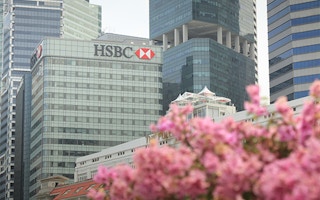HSBC, one of the world’s largest financial services groups, may have broken European Union (EU) sanctions regulations by working with a Russian bank on the financing of a new coal-fired power plant in Vietnam, according to an investigation by Market Forces, an environmental group that campaigns against the funding of fossil fuel power projects.
To continue reading, subscribe to Eco‑Business.
There's something for everyone. We offer a range of subscription plans.
- Access our stories and receive our Insights Weekly newsletter with the free EB Member plan.
- Unlock unlimited access to our content and archive with EB Circle.
- Publish your content with EB Premium.
The London-based global banking giant is the lead arranger and global coordinator for the financing of LongPhu1, a 1,200 megawatt coal-fired power station that is also being funded by Russian development bank Vnesheconombank.
By working with the Russian entity, HSBC is in breach of sanctions put into place by the EU after Russia annexed Crimea from Ukraine in 2014, Market Forces has claimed. The EU’s rules include restricting the Russian banking sector’s access to the sale of energy-related equipment and technology.
Vnesheconombank is financing the equipment supplies for the $1.59 billion LongPhu1 facility in Vietnam’s Soc Trang province, which is being led by state-owned energy company PetroVietnam.
Market Forces has lodged a complaint with the EU and the United Kingdom Treasury Office over the matter.
HSBC responded to questions from Eco-Business about the potential breach in EU sanctions regulations by saying that its “relationship in the financing of LongPhu1 is with PetroVietnam,” and not Vnesheconombank.
The transaction is in line with the bank’s global sanctions policy, which is listed under its financial crime risk policies, HSBC said.
“
With clean, renewable energy alternatives available to coal, HSBC should be prioritising making these the new energy source of choice, rather than condemning communities to decades more toxic pollution.
Julien Vincent, executive director, Market Forces
The first phase of the LongPhu1 coal plant is scheduled to be up and running next month, with a second phase, another 600 MW capacity, to be completed by May 2018.
The plant, along with others in the south of Vietnam, is being built to address energy security problems in the region, the country’s deputy prime minister Hoang Trung Hai has said.
Market Forces has pointed out that the construction of coal-fired power stations in the country will lock it into producing greenhouse gas emissions and toxic air pollution for generations.
The group also pointed out that HSBC has just announced a new sustainable financing initiative that includes a pledge to discontinue the financing of new coal-fired power plants.
The bank’s announcement, made on November 6, included a commitment to create a US$100 billion fund to tackle climate change, source 100 per cent of its electricity from renewable sources by 2030, support the development of new renewable power facilities.
However, HSBC has clarified that the pledge to exit coal only applies to developed countries, not emerging economies such as Vietnam.
An HSBC spokesperson told Eco-Business in a statement: “For now, coal is such a fundamental part of power generation in many developing countries where we operate that we do not think it is the right thing, from a social or economic perspective, to withdraw.
“What we want to do is work with clients to make sure that, when they build new plants, they are the cleanest possible and to work with investors in those markets to develop renewable resources,” the spokesperson said.
Market Forces executive director Julien Vincent said it was “outrageous” for HSBC to justify new coal power plants just because coal power is a major energy source today.
“Coal is also a highly polluting source of power, attacking people’s health, environments on which communities survive, and making climate change worse - an issue important to the sustainability of humanity.”
Vincent added: “We need to transition away from coal and you don’t do that by building more of it. With clean, renewable energy alternatives available to coal, HSBC should be prioritising making these the new energy source of choice, rather than condemning communities to decades more toxic pollution.”
He also challenged HSBC’s claim that it was working only with PetroVietnam on the LongPhu1 project. For the bank to fulfill its role as a mandated lead arranger, it would need to engage more broadly than just with PetroVietnam, bringing parties together and arranging financial transactions, noted Vincent.
“The idea that HSBC can satisfactorily play its role without dealing with Vnesheconombank, either directly or indirectly, is laughable,” he said.
Market Forces is waiting for a response from the EU and the UK Treasury over the matter.
HSBC’s new coal commitments announced earlier this month follow the exits from coal lending by global rivals Deutsche Bank, Credit Agricole and others.










